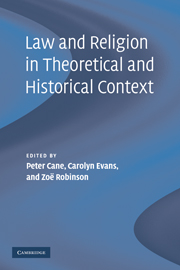Book contents
- Frontmatter
- Contents
- List of Contributors
- 1 Introduction
- 2 The moral economy of religious freedom
- 3 Understanding the religion in freedom of religion
- 4 Why religion belongs in the private sphere, not the public square
- 5 Pluralism in law and religion
- 6 The influence of cultural conflict on the jurisprudence of the religion clauses of the First Amendment
- 7 From Dayton to Dover: the legacy of the Scopes Trial
- 8 A very English affair: establishment and human rights in an organic constitution
- 9 Days of rest in multicultural societies: private, public, separate?
- 10 Australian legal procedures and the protection of secret Aboriginal spiritual beliefs: a fundamental conflict
- 11 Secular and religious conscientious exemptions: between tolerance and equality
- 12 Law's sacred and secular subjects
- 13 Freedom of religion and the European Convention on Human Rights: approaches, trends and tensions
- Index
- References
9 - Days of rest in multicultural societies: private, public, separate?
Published online by Cambridge University Press: 07 July 2009
- Frontmatter
- Contents
- List of Contributors
- 1 Introduction
- 2 The moral economy of religious freedom
- 3 Understanding the religion in freedom of religion
- 4 Why religion belongs in the private sphere, not the public square
- 5 Pluralism in law and religion
- 6 The influence of cultural conflict on the jurisprudence of the religion clauses of the First Amendment
- 7 From Dayton to Dover: the legacy of the Scopes Trial
- 8 A very English affair: establishment and human rights in an organic constitution
- 9 Days of rest in multicultural societies: private, public, separate?
- 10 Australian legal procedures and the protection of secret Aboriginal spiritual beliefs: a fundamental conflict
- 11 Secular and religious conscientious exemptions: between tolerance and equality
- 12 Law's sacred and secular subjects
- 13 Freedom of religion and the European Convention on Human Rights: approaches, trends and tensions
- Index
- References
Summary
Introduction
Days of rest have not been given a central place in discussions of modern societies. However, regulation of days of rest provides a fascinating illustration of a variety of central issues in such societies. In Western societies, the issue of days of rest has usually been seen as concerned with the relationship between state and religion. Religions make demands about the way the day of rest, which is also a day of special worship, should be observed. So long as communities were religious and homogeneous, religious days of rest were generally observed. Usually, the right of members of other religions to their own observances was respected to some extent, at least in the private sphere. As societies became more secularized and plural, such arrangements began to be challenged both by secular members of the majority culture, who resented what they saw as religious coercion, and by members of minority cultures and religions, who saw an opportunity to reduce the burdens they had carried under the traditional arrangement. Both challenges invoked human rights discourse, demanding that arrangements respect individual as well as collective rights to freedom of religion and freedom from religion, and rights to culture. The subject is also discussed as an issue of minority rights, and as an aspect of the ideal of multiculturalism. In some countries, the issue has legal or even constitutional significance.
Information
- Type
- Chapter
- Information
- Law and Religion in Theoretical and Historical Context , pp. 186 - 213Publisher: Cambridge University PressPrint publication year: 2008
References
Accessibility standard: Unknown
Why this information is here
This section outlines the accessibility features of this content - including support for screen readers, full keyboard navigation and high-contrast display options. This may not be relevant for you.Accessibility Information
- 2
- Cited by
